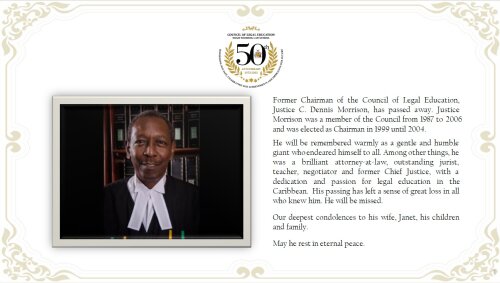Best Father's Rights Lawyers in Port of Spain
Share your needs with us, get contacted by law firms.
Free. Takes 2 min.
Free Guide to Hiring a Family Lawyer
List of the best lawyers in Port of Spain, Trinidad and Tobago
About Father's Rights Law in Port of Spain, Trinidad and Tobago
The concept of Father's Rights pertains to legal rights that fathers have in connection to their children. This includes their rights regarding child custody, visitation, and decisions about the child's upbringing and welfare. In Port of Spain, Trinidad and Tobago, these rights are granted under the Family Law Act. While the law provides parents with equal rights, it mostly depends on the child's best interest and welfare.
Why You May Need a Lawyer
You may require legal help in several situations related to Father's Rights. For instance, should there be any disputes surrounding child custody or visitation arrangements post-separation or divorce, you may need a lawyer to present your case. A lawyer can also help in cases where you believe your rights as a father aren't being respected, or if you need to negotiate child support payments.
Local Laws Overview
In Port of Spain, Trinidad and Tobago, family law is governed by several acts and ordinances. The most notable include the Family Law (Guardianship of Minors, Domicile, and Maintenance) Act, and the Children Act. These legal texts underline the principles of equality and fairness, mandating that decisions must always prioritize the child's best interest. Fathers have as much right as mothers to seek custody and participate in their child's life.
Frequently Asked Questions
What if the mother is denying me access to my child?
If you're being denied access to your child, it's recommended that you consult with a lawyer to review your case and provide legal advice. They can guide you on the steps to take based on local family laws.
Does a father have to pay child support if he doesn't visit the child?
Yes, in Trinidad and Tobago, a father is legally required to provide financial support for his child, regardless of whether he visits the child or not.
Can a father apply for joint custody?
Yes, fathers in Port of Spain, Trinidad and Tobago can apply for joint custody. The law gives equal rights to both parents, however, the final decision is based on the child's best interest.
How does the court determine the child's best interest?
When deciding on the child's best interest, the court considers various factors including the age of the child, parent’s ability to provide for the child's needs, the child's wishes, and overall health and safety.
What if the mother has relocated with the child without my consent?
It's generally considered as illegal for a parent to relocate a child without the other parent's consent or without a court order. If this happens, consult a lawyer immediately for legal recourse.
Additional Resources
The Family Court of Trinidad and Tobago can provide more information regarding father's rights, child custody, and related subjects. Other resources include the Legal Aid and Advisory Authority and the Law Association of Trinidad and Tobago.
Next Steps
If you require legal assistance in father's rights related matters, you should contact a family lawyer in Port of Spain, Trinidad and Tobago. Consultation with a lawyer can help clarify your legal position and guide you on how best to protect your rights as a father.
Lawzana helps you find the best lawyers and law firms in Port of Spain through a curated and pre-screened list of qualified legal professionals. Our platform offers rankings and detailed profiles of attorneys and law firms, allowing you to compare based on practice areas, including Father's Rights, experience, and client feedback.
Each profile includes a description of the firm's areas of practice, client reviews, team members and partners, year of establishment, spoken languages, office locations, contact information, social media presence, and any published articles or resources. Most firms on our platform speak English and are experienced in both local and international legal matters.
Get a quote from top-rated law firms in Port of Spain, Trinidad and Tobago — quickly, securely, and without unnecessary hassle.
Disclaimer:
The information provided on this page is for general informational purposes only and does not constitute legal advice. While we strive to ensure the accuracy and relevance of the content, legal information may change over time, and interpretations of the law can vary. You should always consult with a qualified legal professional for advice specific to your situation.
We disclaim all liability for actions taken or not taken based on the content of this page. If you believe any information is incorrect or outdated, please contact us, and we will review and update it where appropriate.














